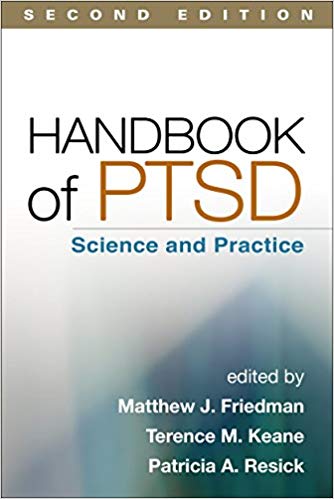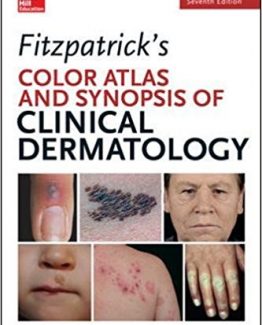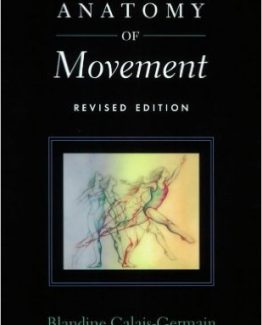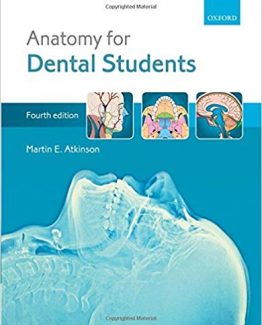Handbook of PTSD: Science and Practice 2nd Edition, ISBN-13: 978-1462525492
[PDF eBook eTextbook]
718 pages
Publisher: The Guilford Press; Second edition (October 20, 2015)
Language: English
ISBN-10: 1462525490
ISBN-13: 978-1462525492
Widely regarded as the definitive reference, this handbook brings together foremost authorities on posttraumatic stress disorder (PTSD). Diagnostic, conceptual, and treatment issues are reviewed in depth. The volume examines the causes and mechanisms of PTSD on multiple levels, from psychological processes to genes and neurobiology. Risk and resilience processes are addressed across development and in specific populations. Contributors describe evidence-based assessment and treatment approaches as well as promising emerging interventions. The integrative concluding chapter identifies key unanswered questions with important implications for science and practice.
New to This Edition
– Reflects major research advances and the new diagnostic criteria in DSM-5.
– Chapters on the dissociative subtype of PTSD, child assessment, couple and family therapies, and group treatments.
– Chapters on research methods, Internet-based interventions, telemental health, and implementation of best practices.
– Many new authors and extensively revised chapters.
Review
“This is an extraordinary volume filled with nuanced and thoughtful discussions of recent advances in every facet of research on PTSD. The contributors are a veritable who’s who of leaders in basic and translational PTSD research. ‘Must’ reading for anyone interested in understanding the nosology, epidemiology, causes, consequences, or treatment of this important disorder.”–Ronald C. Kessler, PhD, McNeil Family Professor of Health Care Policy, Harvard Medical School
“Handbook of PTSD, Second Edition, captures the state of the science of the field, cementing its place as the premier go-to reference. The volume starts from the foundations and includes comprehensive coverage of both science and practice. It is marked by its nuanced approach; contributors readily acknowledge controversies in the field and provide the reader with the evidence needed to inform reasoned discussion about open areas of debate. The book will be a tremendous asset to classes concerned with psychiatry, psychology, or the epidemiology of trauma and its consequences.”–Sandro Galea, MD, DrPH, Gelman Professor and Chair, Department of Epidemiology, Mailman School of Public Health, Columbia University
“Unequaled in scope, this impressive work offers a thorough account of what is known about PTSD. The second edition reflects enormous recent strides in such areas as neurocognitive alterations associated with PTSD, the dissociative subtype, genetics, childhood traumatic stress, and various forms of treatment. This book should be required reading for all trauma-oriented researchers, clinicians, and graduate students.”–Onno van der Hart, PhD, Department of Clinical and Health Psychology (Emeritus), Utrecht University, The Netherlands
“I teach a senior capstone course in Trauma Psychology. The Handbook of PTSD offers a comprehensive overview of the scientific and clinical knowledge underlying trauma psychology that is quite readable, yet thoroughly referenced. When we discussed cutting back on various readings to provide more time for a thesis, my students asked to retain most of the assigned Handbook readings because they found them so useful and interesting! The contributors are top experts who provide fair treatment of controversial theories and clinical topics fairly. This is the only book I have found that provides the breadth and depth needed for the primary text for an upper-level undergraduate course in Trauma Psychology, and it would also be excellent for a graduate course.”–Robert Whitney, PhD, Adjunct Assistant Professor, Department of Psychology, Temple University
“Once again, the Handbook meets its lofty goal of advancing our understanding of PTSD. This volume fully updates the field and is a cornucopia of synthesis, integration, and review of the cradle-to-grave issues involving PTSD. Comprehensive and authoritative, it should be kept within arms’ reach of clinicians, researchers, and educators, and is an excellent text for a graduate course on traumatic stress.”–Stevan E. Hobfoll, PhD, Chair, Department of Behavioral Sciences, Rush University Medical Center
“The publication of this timely second edition responds to ongoing, extremely dynamic developments in the field. The book reflects the cutting edge of our scientific understanding of the neurobiology and psychology of trauma and its repercussions for humankind globally. Advances in telemental health technology are nicely covered, as are Internet-based interventions. I’ll certainly keep recommending the Handbook as an essential reference for clinicians and researchers as well as a classroom text.”–Ulrich Schnyder, MD, Department of Psychiatry and Psychotherapy, University Hospital Zurich, Switzerland
“A scholarly tour de force. The virtuosity lies in the convergence of three factors of any significant writing endeavor: aspiration, organization, and, most critically, execution….It is hard to imagine anyone working in the field of PTSD…who would not find this comprehensive collection of reviews grounding as well as inspirational.” (on the first edition)
, PsycCRITIQUES Published On: 2008-07-30
“Highly organized, balanced, evidence based, and comprehensive….An essential resource for anyone who works as a clinician or researcher in the trauma field, and it is recommended for residency and graduate training programs….Irrespective of the reader’s school of thought, discipline, or level of training, this book provides a multitude of ways to enrich and inspire a better understanding of this complex field.” (on the first edition)
, New England Journal of Medicine Published On: 2008-06-01
“The editors have assembled voices from psychology and psychiatry, research, and clinical practice. Superb editing ensures that the writing is nearly seamless, sounding as though it were written by a single author rather than by many expert contributors….Each chapter raises the level of discourse about traumatic stress in ways that are integrative rather than divisive….Friedman, Keane, and Resick provide a clear roadmap for the next 10 years of research and clinical innovation.” (on the first edition)
, Journal of Trauma & Dissociation Published On: 2009-04-01
“Anyone looking for a sophisticated introduction to trauma and PTSD will find the Handbook of PTSD an excellent resource that will provide a solid review of scholarship and practice.” (on the first edition)
, Social Service Review Published On: 2009-03-01
“This second edition offers a comprehensive view of PTSD, using a historical perspective in combination with the most relevant research to present updated concepts….The book proves to be a strong resource for improving readers’ overall comprehension of virtually every aspect of PTSD.”
Doody’s Review Service Published On: 2015-07-21
About the Author
Matthew J. Friedman, MD, PhD, was Executive Director of the National Center for PTSD, White River Junction VA Medical Center, for almost 25 years. He now serves as Senior Advisor to the Center and remains Professor of Psychiatry and of Pharmacology and Toxicology at the Geisel School of Medicine at Dartmouth College. In 2014 he helped to establish the National PTSD Brain Bank, a collaborative effort of the National Center for PTSD and other leading academic and research institutions. Dr. Friedman is a Distinguished Lifetime Fellow of the American Psychiatric Association, past president of the International Society for Traumatic Stress Studies (ISTSS), and past chair of the scientific advisory board of the Anxiety and Depression Association of America (ADAA). He chaired the American Psychiatric Association’s DSM-5 Work Group that developed diagnostic criteria for PTSD and related disorders. He is a recipient of the ISTSS Lifetime Achievement Award, among many other honors.
Terence M. Keane, PhD, is Director of the Behavioral Sciences Division of the National Center for PTSD, Associate Chief of Staff for Research at the VA Boston Healthcare System, and Professor of Psychiatry and Assistant Dean for Research at Boston University School of Medicine. Dr. Keane is past president of ADAA, ISTSS, and the Division of Trauma Psychology of the American Psychological Association (APA Division 56). He is a recipient of the ISTSS Lifetime Achievement Award, among many other awards.
Patricia A. Resick, PhD, ABPP, is Professor in the Department of Psychiatry and Behavioral Sciences at Duke University Medical Center. She was Director of the Women’s Health Sciences Division of the National Center for PTSD at VA Boston Healthcare System from 2003 to 2013. Dr. Resick has served on the editorial boards of nine scientific journals, as Associate Editor of the Journal of Consulting and Clinical Psychology, and as president of ISTSS and of the Association for Behavioral and Cognitive Therapies (ABCT). She is a recipient of awards including the Robert S. Laufer Memorial Award for Outstanding Scientific Achievement from ISTSS, the Leadership Award from the Association for VA Psychologist Leaders, the Outstanding Contributions Award for Educational/Training Activities from ABCT, and the Lifetime Achievement Award from APA Division 56.
What makes us different?
• Instant Download
• Always Competitive Pricing
• 100% Privacy
• FREE Sample Available
• 24-7 LIVE Customer Support






Reviews
There are no reviews yet.